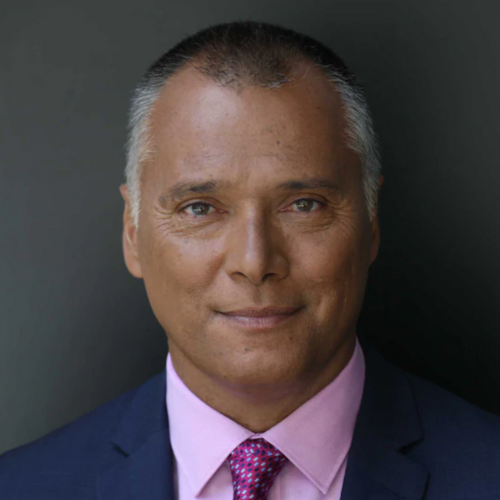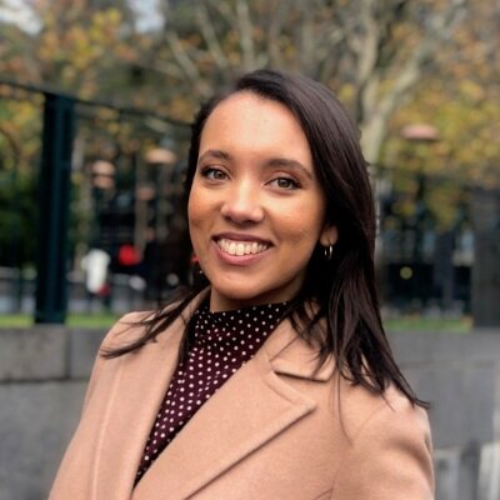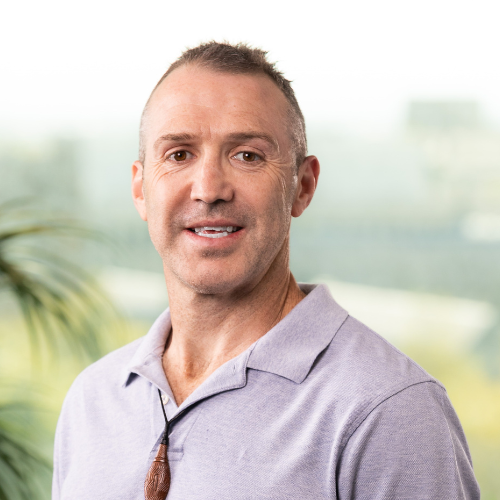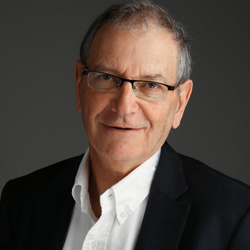Stan Grant | David Cooper Lecture

Stan Grant | Isabella Higgins
Soul blindness: how a sick society is killing us all
In the 2024 David Cooper Lecture, award-winning journalist, writer and scholar Stan Grant will draw on his Aboriginal culture, years covering the world’s conflict zones and PhD in theology to argue that we are “spiritually sick”, and politics is no answer to the “wounds of the soul”.
Stan believes we are entering the twilight of modernity. The promise of perpetual peace has descended into a war of all against all. Identity – both individual and collective – has supplanted civic bonds. Trust, truth and faith have been replaced by cynicism and self-adulation. Gross inequality is a cancer on society. Mental illness is at record levels. Democracy is in retreat and authoritarianism on the rise.
At the heart of this malaise is a moral atrophy, the sign of an alienated society. What chance, therefore, for the marginalised? Join us for an evening of discussion with Stan Grant as he takes a bigger picture view of health and the crisis in modern western culture.
This event is co-presented by the UNSW Centre for Ideas, Kirby Institute and UNSW Medicine & Health.
Please note, Bridget Brennan will no longer be the chairperson of this event due to unforeseen circumstances.
ABOUT THE DAVID COOPER LECTURE
The David Cooper Lecture honours the legacy of the Kirby Institute’s founding director, Professor David Cooper AC, who passed away in 2018. David was an internationally renowned scientist and HIV clinician who laid the foundations for Australia’s ongoing leadership in the fight against the global HIV epidemic.
Make a donation today to support David Cooper’s incredible vision for equitable access to healthcare: unsw.to/DavidCooperMemorialFund.
LIVE EVENT & VENUE INFORMATION
Leighton Hall is located inside the John Niland Scientia Building at UNSW Sydney's Kensington campus. Please note this is a live event only, and will not be available via livestream.
ACCESS
Wheelchair Access
The closest accessible drop off point to Leighton Hall is via Gate 11, Botany Street. More information on getting there can be found via our interactive accessibility map available here.
Assisted Listening
Leighton Hall has hearing assistive technology available. Patrons wishing to utilise this service must collect a Roger™ inductive neck loop receiver from the venue staff, and this system can be used with a hearing aid or cochlear implant with a T-coil, or with headphones.
Auslan & Captioning
This event will be live captioned. Auslan interpreting services can be provided for selected talks upon request.
Contact
To book and discuss access services, please call the Centre for Ideas on 02 9065 0485 or email centreforideas@unsw.edu.au.
PUBLIC TRANSPORT & PARKING
Leighton Hall (John Niland Scientia Building) is easily accessible via public transport. The closest light rail stop is the UNSW High Street (L2 line) and the closes bus stop is UNSW Gate 14, Barker Street (303). For more information please call the Transport Infoline on 131 500 or visit For more information please call the Transport Infoline on 131 500 or visit transportnsw.info.
Paid casual and visitor parking is offered via the CellOPark App and ‘pay by plate meters’ in all other UNSW car parks. The Botany St Car Park (Gate 11) parking station is the closest to the venue, and is located here. For more information head here.
CONTACT
For all enquiries, please email centreforideas@unsw.edu.au or call the Centre for Ideas on 02 9065 0485.
The Centre for Ideas is happy to receive phone calls via the National Relay Service. TTY users, phone 133 677, then ask for 02 9065 0485. Speak and Listen users, phone 1300 555 727 then ask for 02 9065 0485. For more information on all other relay calls visit here.

Stan Grant
Stan Grant is a Wiradjuri and Kamilaroi man and one of Australia’s most respected and awarded journalists. He is Distinguished Professor and Chair of Yindyamarra Nguluway Trust at Charles Sturt University. In 2016, he was appointed to the Referendum Council on Indigenous recognition. Stan is Professor of Indigenous Belonging at Charles Sturt University.
Stan has worked for the ABC, SBS, the Seven Network and Sky News Australia and, from 2001 to 2012, worked for CNN as an anchor and senior correspondent in Asia and the Middle East. Over the course of his career, he has received a string of prestigious international and Australian awards.
In 2015, Stan won a Walkley Award for his coverage of Indigenous affairs and, in 2016, his acclaimed bestselling book, Talking to My Country, won a Walkley Book Award. He has since published another two books, Australia Day and With the Falling of the Dusk, both national bestsellers. Stan’s most recent book is The Queen is Dead.

Isabella Higgins
Isabella Higgins started her career in the ABC’s digital newsroom, and has since worked in their Brisbane, Rockhampton and Sydney newsrooms, as well as stints in their Parliament House bureau. Working across TV, radio and online she’s covered many topics from cane toads to constitutional debates. She grew up in Queensland, as part of a proud Torres Strait Islander family. She has covered Indigenous Affairs for the ABC for the last two years. She is currently their National Indigenous Affairs Correspondent.

Brett Biles
IntroductionAssociate Professor Brett Biles is a Murrawarri man originally from Brewarrina. He has been living on Wiradjuri country for the last 20 years. Brett is the inaugural Pro Vice-Chancellor Indigenous Engagement and Research at UNSW. Brett has contributed to Indigenous health and wellbeing for the last 15 years. Prior to this role Brett was the inaugural Associate Dean Indigenous of the Faculty of Medicine and Health and a Senior Scientia Lecturer. Brett was also the inaugural Director of Indigenous Health Education in the Faculty of Medicine and Health.
Brett holds a Doctor of Philosophy, Master of Indigenous Health and a Bachelor of Physiotherapy. Brett’s research focuses on Aboriginal health and wellbeing. Brett is a Chief Investigator on multiple Australian Research Council, Medical Research Future Fund Aboriginal health and wellbeing related research projects.

About David Cooper
Scientia Professor David Cooper AC was an internationally-renowned immunologist, clinician researcher, and the inaugural director of the Kirby Institute at its foundation in 1986, and remained in the role until he passed away on Sunday 18 March 2018 after a short illness. He initiated ground-breaking, collaborative infectious disease research that has saved countless lives in Australia, and throughout the world. He was among the first responders when the HIV epidemic reached Australia in the early 1980s, and established Australia’s ongoing global leadership in the fight against the global HIV epidemic.
Professor Cooper received many professional accolades. He was made an Officer in the General Division of the Order of Australia (AO) in 2003, and posthumously appointed Companion of the Order of Australia (AC) in 2018. David Cooper was a dedicated and compassionate doctor to many HIV patients, and those with other immunological conditions, throughout his lifetime, and is remembered as a great friend and mentor to all who were fortunate to know him.